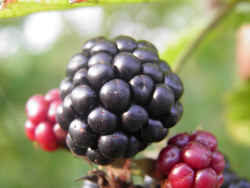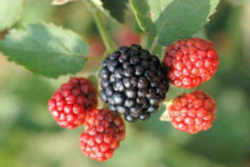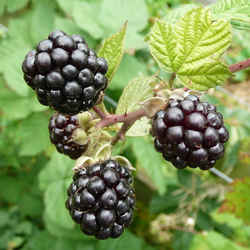Alabama Symbols
Alabama State Fruit
Blackberry
(Rubus occidentalis)
Adopted on May 1, 2004.
Alabama designated blackberry (Rubus, R. occidentalis) as the official state fruit symbol in 2004.
The Alabama state fruit was adopted as part of a project by a pair of third grade teachers, Susan Sims and Amy Jones, and their students at Fairhope Elementary School.
The project begin in August of 2002. Students researched the fruit, wrote the legislation, and enlisted the help of State Senator Bradley Byrne of Fairhope and State Representative Randy Davis of Daphne to sponsor their proposal in the Alabama State Legislature, but it wasn't until 2004, SB163 was approved unanimously by the Senate on March 4, 2004.
Passed on to the House, SB163 ran into some resistance but all attempts to derail the bill failed however and, on April 29, 2004, the Alabama House of Representatives voted 91-1 to approve the blackberry as the official fruit of Alabama.
On May 1, 2004, Governor Bill Riley signed the legislation at Fairhope Elementary school making the blackberry the official fruit of Alabama.
Alabama State Fruit: Blackberry
 This seems to have been a good choice
because blackberries are among the easiest of all fruits to grow. Few fruits produce more dependably than blackberries. Good plants may produce crops
for 15 years or more. Blackberry varieties can have a range of distinctive flavors from sweet to tart. The fruit can be used fresh, frozen, or canned,
and can be made into jams or wine. Well established plants will produce about one quart or more of fruit per linear foot of row. All these features
make blackberries an attractive crop for home gardeners.
This seems to have been a good choice
because blackberries are among the easiest of all fruits to grow. Few fruits produce more dependably than blackberries. Good plants may produce crops
for 15 years or more. Blackberry varieties can have a range of distinctive flavors from sweet to tart. The fruit can be used fresh, frozen, or canned,
and can be made into jams or wine. Well established plants will produce about one quart or more of fruit per linear foot of row. All these features
make blackberries an attractive crop for home gardeners.
The word "blackberry" is properly the name of both the shrub and the fruit. In technical botanical language, the fruit is not a berry at all, but instead an aggregate fruit of numerous drupelets. A good blackberry crop depends on bees visiting the flowers to distribute pollen grains. Fewer bee visits mean fewer drupelets per fruit. Blackberry blossoms are good nectar producers and bees who visit large acreages of blackberries will produce a medium to dark, fruity honey.
The blackberry bush has a scrambling habit of dense arching stems. Wild varieties have thorns; domestic varieties maybe thorned or thornless. Blackberries will tolerate a wider range of soil types than will most other fruits, but they prefer sandy, loamy soils with added organic matter. Planting may be done at any time during the dormant season, but most planting is done during February or early March. Alabama gardeners, start shopping now for cuttings of your new state fruit.
Superstition in the United Kingdom holds that blackberries should not be picked after the 15th of September because the devil has claimed them then, leaving a mark on the leaves. These is some value behind this legend because after this date in the UK the wetter and cooler weather often allows the fruit to become infected by various molds that give the fruit an unpleasant flavor and maybe toxic.
Portion of an article by Shane Harris, County Extension Agent - Published in The Outlook and The Dadeville Record
Blackberries: The State Fruit of Alabama
Which fruit would think is probably the easiest to grow in Alabama? Blueberries? Muscadines? Maybe figs? All of those are fairly easy to grow and
they do very well here. But how about blackberries; did you forget about them? Not only do they grow abundantly wild all across Alabama, they can tolerate
our hot dry summers and are very well suited to the Alabama climate. Blackberries are special small fruit. In fact, just last week, the Alabama House
of Representatives approved a bill late Thursday naming the blackberry as Alabama's official state fruit.
Blackberries have always been an important summer fruit. Many people throughout the years have grown up and spent time picking wild blackberries. It
was fun and a way of life, despite all the briers and red bugs. The best part was enjoying the fruits of the labor - such as blackberry cobblers, pies,
jellies, and jams.
Today, with fewer of us growing our own food, picking wild blackberries is a forgotten pastime. The days of picking them out in the fields are likely
now apart of history. But blackberries are still around and are now being grown to be even better. Many new varieties of blackberries, including thorny
and thornless, have been developed over the years that can planted and enjoyed in the home orchard. Not only do they have very few pest problems but
they also have very high yields. The days of small berries are gone; expect the new varieties to have berries that are one inch or greater.
You can purchase blackberries with or without thorns. A few thorny varieties that have good characteristics include Cheyenne, Choctaw, Shawnee, Chickasaw,
and Kiowa. Some of the newer thornless varieties are Apache, Navaho, and Ouachita.
Regardless which variety of blackberry you choose, be sure to select a site that has good air and water drainage. Blackberries, like other fruits,
are subject to damage by late spring frosts during bloom time. Plant blackberries on slopes or on level elevated areas so that cold air will drain
away from the plants on frosty nights.
Blackberries also do not like water standing around their roots. Don't plant them in poorly drained soils where excess water might accumulate. Last, blackberries need full sun to be productive. They are adaptable to most any type of soil.
Alabama Law
The law designating the blackberry as the official Alabama state fruit is found in the Unannotated Code of Alabama 1975, Title 1, Chapter 2, Section 1-2-35
TITLE 1.
Chapter 2 STATE SYMBOLS AND HONORS.
Section 1-2-35 State fruit.
Section 1-2-35 State fruit. The Blackberry, Rubus, R. occidentalis, is hereby designated and named as the official fruit of Alabama.
(Act 2004-363, p. 592, §1.)
Taxonomic Hierarchy: Blackberry
Kingdom: Plantae - Plants
Subkingdom: Tracheobionta - Vascular plants
Superdivision: Spermatophyta - Seed plants
Division: Magnoliophyta - Flowering plants
Class: Magnoliopsida - Dicotyledons
Subclass; Rosidae
Order: Rosales
Family; Rosaceae - Rose family
Genus: Rubus L. - blackberry
Species: Rubus occidentalis L. - black raspberry

List Official US State Foods







